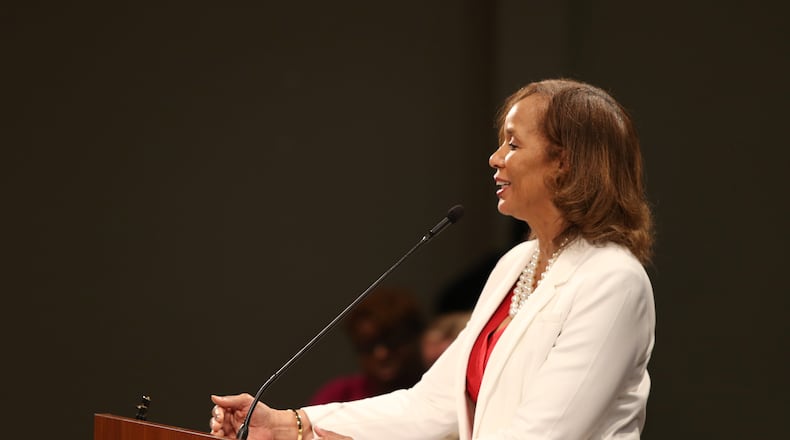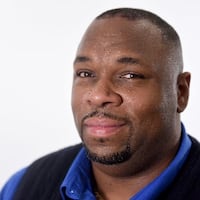DeKalb County School District said this year it would not let a critical special education teacher shortage affect learning, but some parents say their special-needs students are not consistently receiving guaranteed specialized instruction.
Among the concerns early into this school year are teachers not identifying student behaviors that could trigger outbursts, some students missing co-teachers or aides to assist with individualized learning and officials disregarding the need for additional time during testing.
“I’m more worried about my 10-year-old at school than I am my 7-month old at the babysitter,” said parent Lauren Taylor, whose fourth-grade son attends Montgomery Elementary School.
Special education teachers are responsible for some of the most vulnerable learners and must meet certain federal and state requirements. The job often requires much more paperwork to show students are taught according to Individualized Education Programs (IEPs) built to teach students at their respective paces. District officials pledged to make sure those requirements were being followed, despite reporting 170 special education teacher vacancies in July.
Linda Woodard, the district's interim human resources czar, said Wednesday that now fewer than 40 vacancies exist. Most of the vacancies were addressed through aggressive recruiting and strategic thinking on the part of her staff and schoolhouse leaders who have identified and either reassigned teachers who were certified in special education but not teaching it, or promoting paraprofessionals who could soon achieve certifications.
“We’ve had meetings weekly about how many positions were left,” Woodard said. “I held (the hiring managers) accountable. We came with different strategies. We checked (the online employment portal) on a regular basis. Recruitment trips. We made sure we formed partnerships with colleges and universities.
“We’ve done the hard work.”
Woodard said 17 vacancies were address by combining classes. Another six were filled by current general education teachers with special education certifications. Eleven paraprofessionals were promoted to teaching positions, either having achieved certification or who will be certified by the end of the year. Another 116 hires include special education and interrelated teachers, as well as returning retirees who have experience designing and executing IEPs, part of a job-share program where they work with other teachers in the same classroom.
“We’re not going to do anything to jeopardize the students and their education,” Woodard said.
She could not answer questions on parent concerns with how individualized education programs are being handled by the district, referring those questions to special education coordinators.
“My job is to get quality teachers in there,” she said.
District officials did not respond to questions about the concerns parents raised about specialized education plans not being followed.
Taylor said her son suffers from dyslexia. And because of a short-term working memory, his education plan calls for homework assignments to be communicated with his parents.
That was not happening, she said.
Communication got better after a four-hour meeting last month where Taylor said she brought along an advocate and challenged her son’s teacher to follow his IEP.
Then, she learned from her son that he did not receive extra time or other accommodations listed in his IEP during recent standardized testing. Several other parents she communicates with, whose children also are on IEPs, also relayed stories of their children not getting additional time or other accommodations during testing. Some parents did not speak on the record about their children’s issues, fearing retaliation against themselves or their children.
Taylor said she filed a complaint with the Georgia Department of Education.
“His (IEP) makes sure he is afforded the same education as his peers,” Taylor said of her son. “It doesn’t matter he has a disability. Not all children are going to fit the same mold.”
Communicating with teachers is important, and some parents of DeKalb special-needs students report positive experiences.
Teresa Wright Johnson’s 14-year-old, diagnosed with Attention Deficit Disorder, has an IEP that affords her more time for assignments, sometimes breaking up assignments into parts. The teen understands what assistance she is guaranteed through her education plan. Her daughter’s teacher also is good at communication, Johnson said.
“She called me this summer, introduced herself, set up a meeting,” Johnson said. “She’s on it.”
Johnson, who advocates for other parents, said many parents do not understand their rights. When a teacher isn’t following a student’s plan, it leads to issues that could have been avoided.
“If the teacher is not aware, (the students) are not getting the accommodations they need to be successful,” she said. You run into a lot more behavioral issues. Emotionally, it’s not good for that child, then that disciplinarian stuff comes up in school.”
Tywanna Bailey Britt said she pushes for meetings at the beginning of each school year with the teachers of her children to make sure teachers understand their needs. She requested a meeting with her middle school-age son’s teacher but none has materialized. She said he has a learning disability and was diagnosed with Attention Deficit Hyperactive Disorder.
“Coming from elementary to middle school, you don’t know what to expect,” she said. “He’s done well so far, all As and Bs and one C. But then, you know.
“The grades may only tell one story.”
She did not push for meetings about her other son, who is in high school. Those teachers and coordinators have known him for years and understand his needs and behaviors. Still, she said an IEP coordinator reached out.
Experts suggest investing in internal training programs would boost the number of eligible candidates for special education teaching slots and lower turnover.
Mark Claypool, chief executive officer of Chancelight Behavioral Health Education Therapy, which provides special education services to hundreds of public school programs across the country, said internal programs would help combat the lure of incentives being offered in neighboring districts and in states such as Massachusetts and California, which offer moving and signing bonuses.
”Districts aren’t often equipped to handle that kind of (hiring) problem,” he said. “It’s a good long-term play to have an internal program. Special education is a very competitive environment right now. States are getting creative.”
About the Author
Keep Reading
The Latest
Featured



